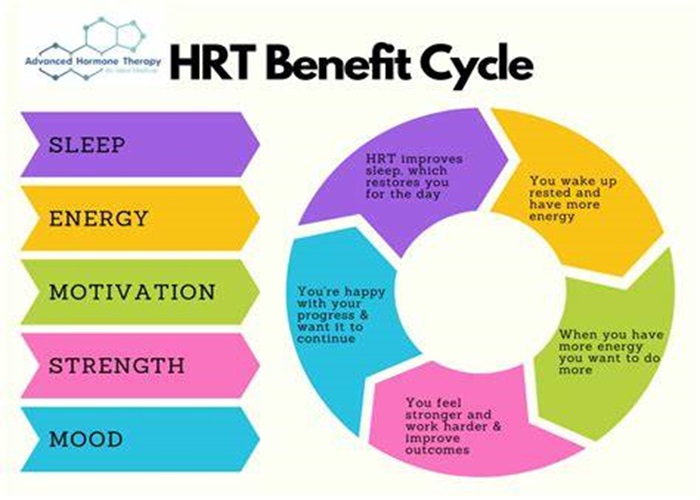Hormone replacement therapy (HRT) is a treatment used to alleviate symptoms of menopause, such as hot flashes, mood changes, and vaginal dryness. In addition to these physical symptoms, menopause can also lead to changes in mood and an increased risk of depression. In this article, we will explore how HRT can help with depression, including the potential benefits and risks of HRT for depression, as well as other strategies for managing depression during menopause.
What is HRT?
HRT is a treatment used to alleviate symptoms of menopause by replacing the hormones that the body stops producing during this time. Menopause occurs when a woman’s ovaries stop producing eggs, which leads to a decrease in hormone production. This can cause a range of symptoms, including hot flashes, mood changes, vaginal dryness, and sleep disturbances.
HRT involves taking hormones, such as estrogen and progesterone, to replace the hormones that the body stops producing during menopause. There are several types of HRT, including:
Estrogen-only therapy: This type of HRT is used for women who have had a hysterectomy and no longer have a uterus.
Combined estrogen and progesterone therapy: This type of HRT is used for women who still have a uterus.
Low-dose vaginal estrogen: This type of HRT is used to treat vaginal dryness and other vaginal symptoms of menopause.
Benefits of HRT for Depression
HRT has been shown to be effective in alleviating symptoms of menopause, such as hot flashes, mood changes, and vaginal dryness. In addition to these benefits, HRT may also have potential benefits for depression, including:
Improved mood: HRT may help improve mood by restoring hormone levels that decline during menopause.
Reduced anxiety: HRT may help reduce anxiety by restoring hormone levels that decline during menopause.
Improved sleep: HRT may help improve sleep by reducing hot flashes and other symptoms of menopause that can disrupt sleep.
Improved cognitive function: HRT may help improve cognitive function, including memory and concentration, in some women.
Reduced risk of depression: HRT may help reduce the risk of depression in some women by restoring hormone levels that decline during menopause.
Several studies have shown that HRT can be effective in reducing symptoms of depression in women going through menopause. For example, a study published in the Journal of Women’s Health found that women who received HRT had significantly lower levels of depression than women who did not receive HRT. Another study published in the Journal of Clinical Endocrinology and Metabolism found that women who received HRT had improved mood and reduced anxiety compared to women who did not receive HRT.
Risks of HRT for Depression
While HRT may have potential benefits for depression, it also carries some risks. Some of the potential risks of HRT for depression include:
Increased risk of breast cancer: HRT may increase the risk of breast cancer in some women. However, the risk of breast cancer is generally small, and the benefits of HRT may outweigh the risks for some women.
Increased risk of blood clots: HRT may increase the risk of blood clots, which can lead to deep vein thrombosis (DVT) or pulmonary embolism (PE). The risk of blood clots is highest during the first year of HRT use and in women who have other risk factors for blood clots, such as smoking or a history of blood clots.
Increased risk of stroke: HRT may increase the risk of stroke in some women. The risk of stroke is highest in women who have other risk factors for stroke, such as high blood pressure or a history of stroke.
Increased risk of gallbladder disease: HRT may increase the risk of gallbladder disease.
Increased risk of dementia: Some studies have suggested that HRT may increase the risk of dementia in women over the age of 65. However, other studies have found no increased risk of dementia with HRT use.
It is important to discuss the potential benefits and risks of HRT with your healthcare provider to determine if it is the right treatment option for you.
Strategies for Managing Depression during Menopause
While HRT may have potential benefits for depression, there are other strategies that can be used to manage depression during menopause. Here are some strategies for managing depression during menopause:
Exercise: Regular exercise can help improve mood and reduce symptoms of depression. Exercise has been shown to increase the production of endorphins, which are natural mood-boosters.
Healthy diet: Eating a healthy diet that is low in processed foods and high in fruits, vegetables, and lean protein can help improve mood and reduce symptoms of depression. Some studies have suggested that a Mediterranean-style diet, which is high in fruits, vegetables, whole grains, and healthy fats, may be particularly beneficial for reducing symptoms of depression.
Stress management: Practicing stress management techniques, such as meditation, yoga, or deep breathing, can help reduce stress and improve mood. Stress can contribute to the development of depression, so finding ways to manage stress is important for managing depression.
Therapy: Cognitive-behavioral therapy (CBT) and other types of therapy can be effective in managing depression during menopause. Therapy can help women develop coping strategies for managing symptoms of depression and improve their overall mental health.
Antidepressant medication: Antidepressant medication can be effective in treating symptoms of depression during menopause. Selective serotonin reuptake inhibitors (SSRIs) are a type of antidepressant commonly used to treat depression during menopause.
Conclusion
HRT is a treatment used to alleviate symptoms of menopause by replacing the hormones that the body stops producing during this time. While HRT may have potential benefits for depression, it also carries some risks. Other strategies for managing depression during menopause include regular exercise, a healthy diet, stress management, therapy, and antidepressant medication. If you are considering HRT for depression or other symptoms of menopause, it is important to discuss the potential benefits and risks with your healthcare provider to determine if it is the right treatment option for you.
Related topics:


